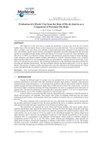Synthesis and characterization of PZT 52/48 ceramics without additives througt nanomertric powder
IF 1.2
4区 材料科学
Q4 MATERIALS SCIENCE, MULTIDISCIPLINARY
引用次数: 0
Abstract
Lead zirconatetitanate solid solutions, Pb(Zr1-xTix)O3 – PZT, are widely recognized for representing a special group of ferroelectric materials with various potential applications in electroceramics and (micro)electronic devices. The PZT ceramics is produced by solid state reaction (conventional route) and temperatures frequently above 1200 C. As a consequence, the cost of ceramic product is expensive. Herein, we present the synthesis and processing conditions of PZT52/48 (x = 0.48) ceramics in which it was possible to lower the sintering temperature down to around 900C. We have applied a route for PZT52/48 obtaining ferroelectric ceramics through sintering of nanometric powders prepared by the polymeric precursor synthesis method (modified Pechini’s method). The sintering was achieved with a temperature of 900oC for 2 hours and the samples got 96% of their theoretical density and 1.3 m mean grain size. The electrical permittivity of the ceramic plates, studied by impedance spectroscopy, presented Curie temperature around 390 oC. Ferroelectric hysteresis measurements revealed that the remnant polarization is 3.2 μC/cm2 and coercive field is 10 kV/cm at 60 Hz. All results and characterizations have shown that the PZT samples obtained with the polymeric route are efficient as the ones prepared in the conventional SSR protocol. Keywords: PZT nanometric powder, Low temperature sintering, Dielectric properties, Ferroelectric hysteresis纳米粉体法制备无添加剂pzt52 /48陶瓷及表征
锆钛酸铅固溶体Pb(Zr1-xTix)O3 - PZT被广泛认为是一类特殊的铁电材料,在电陶瓷和(微)电子器件中具有各种潜在的应用。PZT陶瓷是由固态反应(常规路线)和温度经常高于1200℃生产的。因此,陶瓷产品的成本昂贵。本文中,我们提出了PZT52/48 (x = 0.48)陶瓷的合成和加工条件,可以将烧结温度降低到900℃左右。我们采用了聚合前驱体合成法(改进Pechini法)制备纳米粉体烧结制备铁电陶瓷PZT52/48的途径。烧结温度为900℃,烧结时间为2小时,样品的密度达到理论密度的96%,平均晶粒尺寸为1.3m。阻抗谱法研究了陶瓷板的介电常数,发现其居里温度在390℃左右。铁电迟滞测量结果表明,残余极化为3.2 μC/cm2, 60 Hz时矫顽力场为10 kV/cm。所有结果和表征都表明,用聚合途径获得的PZT样品与用传统SSR方法制备的样品一样高效。关键词:PZT纳米粉体,低温烧结,介电性能,铁电滞后
本文章由计算机程序翻译,如有差异,请以英文原文为准。
求助全文
约1分钟内获得全文
求助全文
来源期刊

Materia-rio De Janeiro
MATERIALS SCIENCE, MULTIDISCIPLINARY-
CiteScore
1.00
自引率
25.00%
发文量
51
审稿时长
6 weeks
期刊介绍:
All the articles are submitted to a careful peer-reviewing evaluation process by the journal''s Editorial Board. The Editorial Board, reviewers and authors make use of a web based proprietary automated tool to deal with the reviewing procedures.the Revista Matéria''s article reviewing restricted access system - SEER. Authors are not informed about the identity of the reviewers.
 求助内容:
求助内容: 应助结果提醒方式:
应助结果提醒方式:


